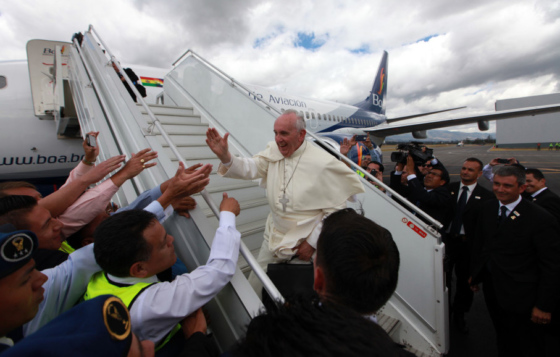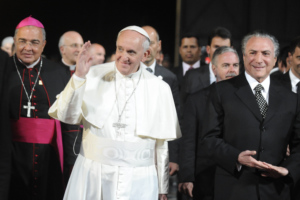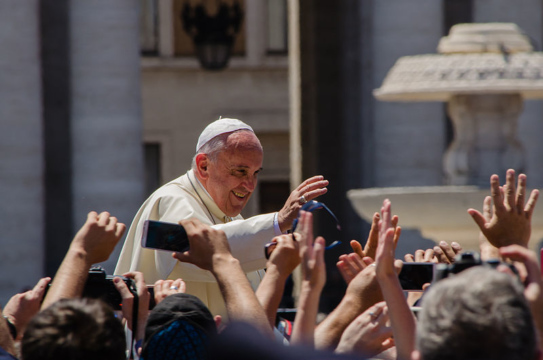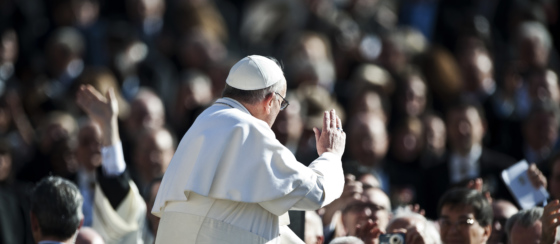
Nicolás & Jorge Mario: The Pope’s Venezuela Test
Venezuela remains a country where the Pope can and should use his influence to help bring about change.
This post is also available in: Spanish Portuguese (Brazil)
By merging his first visits to Cuba and the US into a single week-long trip, Pope Francis has made clear that he will be pursuing the same goals that Pope John Paul II sought from his Papal visit to Cuba some 17 years ago in January 1998, when he called for “Cuba to open itself to the world and the world to open to Cuba.” Francis knows how vitally important the US-Cuban reconciliation effort, in which he has played a key role, is to achieving that mutual opening.
Pope Francis, then the recently appointed Archbishop of Buenos Aires, wrote a short book, The Dialogues of John Paul II and Fidel Castro, on his illustrious predecessor’s visit to Cuba. The Argentine archbishop was fascinated by the exchanges between two leaders of such contrasting views and inspirations, one focused on the individual and his or her rights, responsibilities,and choices, and the other on the central role of state authority in shaping man, woman, and society. No wonder that they frequently appeared to misunderstand one another. But they also agreed on some things. Despite his image as a fervent anti-communist, John Paul conveyed to Fidel—just as Francis would late express to the world—that he was no advocate of unfettered capitalism, that he opposed the neoliberal doctrines that had become popular in many parts of Latin America, and that he thought the US embargo on Cuba was unjust and caused unnecessary suffering.
Francis will likely urge the Cuban authorities to give their citizens greater freedom, not only of religion, but also of expression and association, and allow them the right to disagree, even dissent and oppose. But he will probably also express his commitment to equality and inclusion, and his deep concerns about avoiding excessive materialism and consumerism, which the Cuban leadership will take as praise.
When Pope John Paul traveled to Cuba, he was already widely acclaimed for his part in arousing Polish resistance to communist rule and helping to set Poland on a democratic course (although some historians have concluded that his impact was probably far more modest). Still, expectations were high that he might also spark some change in Cuba. But his accomplishments there were largely limited to the concerns of the Catholic Church. Christmas was turned into a national holiday, Catholics were no longer barred from civil service jobs, even at the highest level, and the Church was given a measure of autonomy from the government, making it the only even modestly independent organization on the island. The Cubans, moreover, amended their constitution to convert their country to a secular, rather than atheistic, state. But the citizens of Cuba gained no new rights or liberties, all opposition to the government continued to be banned and punished, and virtually every aspect of the economy remained in state hands.

In contrast to conservative, anti-communist views attributed to John Paul, Pope Francis will arrive in Cuba with a strongly progressive, even left-leaning reputation. He also comes at a different time. The Cuban government is today gradually giving up its monopoly of power over the economy and allowing the emergence of some individual initiative (although at a pace that may be too slow to address the islands deep economic problems). There is even some hope, certainly more than ever before, of a measure of political opening. Indeed, some Cubans already report an easing of access to information and an increase in tolerance for discussion, even disagreement—although not for dissidence, which the government treats as harshly as ever. Francis will likely urge the Cuban authorities to give their citizens greater freedom, not only of religion, but also of expression and association, and allow them the right to disagree, even dissent and oppose. But he will probably also express his commitment to equality and inclusion, and his deep concerns about avoiding excessive materialism and consumerism, which the Cuban leadership will take as praise.
By flying directly from Santiago, Cuba to Andrew’s Air Force Base just outside of Washington, Pope Francis will highlight his continuing commitment to the normalization of US-Cuban ties—and how important it is for advancing the broader political and economic opening of Cuba. No doubt the Pope will disappoint those in both the US and Cuba who want him to vocally condemn Cuba’s continuing human rights abuses and severe restrictions on basic freedoms, and to demand more rapid changes on the island before additional steps are taken toward reconciliation. As he has to date, Francis will remain pragmatic and realistic in pursuing his principles and goals. He knows well that Cuba cannot be transformed overnight, that it will evolve, if at all, only gradually, and that patience joined with longer term persistence is the most feasible path to a sustained opening. It is also the best way to assure that the Catholic Church, and the Pope himself, will play a continuing, even expanding part in the process over time. Efforts to rush change may result in a backlash of resistance from the Cuban leadership, which retains a deep distrust of any outside interference in the country’s affairs.
No doubt the Pope will disappoint those in both the US and Cuba who want him to vocally condemn Cuba’s continuing human rights abuses and severe restrictions on basic freedoms. As he has to date, Francis will remain pragmatic and realistic in pursuing his principles and goals.
The Pope has other interests in Cuba, beyond the rapprochement to the US. He certainly wants the governments of Latin America and Europe to more fully engage Cuba, and take on greater responsibility for assisting the island through what will be a exceptionally difficult period of economic, political, and social transition. And the Pope will surely use his visit to fortify the Catholic Church’s presence in Cuba—to substantially increase the country’s still small number of Catholic worshipers (the smallest percentage of any Latin American nation), promote the steady expansion of the Church’s autonomy and influence on the island, and make it possible to effectively communicate the Church’s message across Cuba.
Cuba will remain on the Pope’s agenda when he reaches the US, where he is likely to call for a lifting of the embargo and the removal of other obstacles to the economic and social well-being of the Cuban population. In Washington, Philadelphia, and New York, however, Cuba will be competing with other critical priorities. Particularly when he addresses the US Congress, the need for more humane immigration policies will certainly be high on his list, in light of both the the ugly refugee crisis in the Middle East and Europe, and the distasteful, at times odious, discourse about migrants and migration that has emerged in the Republican party. It will be no surprise if the Pope Francis forcefully raises the issue of climate change in Congress, which is today a stubborn obstacle to international action to deal with this global problem. He will also, as usual, raise his voice about the need to address the massive challenges of inequality, poverty, and exclusion across the world. The Pope is well aware of the need for subtlety and circumspection if he is to succeed in advancing human rights, democratic change, and freedom of expression in Cuba. He will be far more direct in letting US political leaders know what issues he believes they can no longer ignore.
The Pope is well aware of the need for subtlety and circumspection if he is to succeed in advancing human rights, democratic change, and freedom of expression in Cuba. He will be far more direct in letting US political leaders know what issues he believes they can no longer ignore.
The Pope’s deepest concern in United States, however, may be the affair of the Church. Although he commands great admiration among US Catholics, he will have to face a few extraordinarily sensitive and controversial issues during his visit, none more emotionally charged than the many child abuse scandals and cover-ups involving priests and other church officials. And there is no doubt that the Pope will want to do what he can to re-energize a US Catholic Church, whose membership, spiritual authority, and vitality have diminished in recent years. In both Cuba and the US, the toughest question for Pope Francis is how to use his enormous popularity, which is unmatched by any world leader, to bring Catholics back to the faith.
Venezuela remains a country where the Pope can and should use his influence to help bring about change.
While Francis is known as the Pope of the Periphery, Cuba has been anything but peripheral to the Vatican over the past two decades.
The Pope’s five-day trip across Mexico is on a route deliberately made to draw attention to the dangerous journey taken by migrants to the US.

